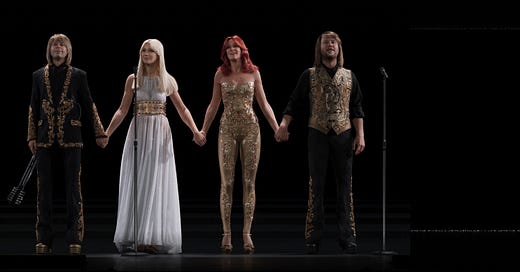Dear subscribers and friends,
This is another premium post in our series on the future of mankind. To see all premium posts and to support Daily Philosophy, please do subscribe here:
Today, and in the next few posts, we will talk about the future of death. Cheer up. It’s fun!
The quick and the dead
I was recently reading an interesting article in Julian Baker’s Substack “Consume & Enjoy”, when I came upon this passage:
Ian Curtis killed himself on 18 May 1980, exactly two calendar months after the release of "Atmosphere" on the 18th of March that year. Seventeen year old Julian at the bus stop listening to that portentous baseline had a crash course in the finality of death realising I'd never hear his voice sing a new lyric.
The music industry and late capitalism of course made sure this wasn't true. Being dead doesn't stop new albums being released when you're the hottest thing since rainbow leggings (it was 1980).
There was a lot more happening in this piece, and if you’re a fan of Wenders, Bowie or Joy Division, or if you have ever wondered what the five stages of decay for angels are, then you might want to have a look.
Anyway, to come back to our topic, when I read this, I immediately thought of Abba’s Voyage, the resurrection in the virtual flesh of the four indestructible Swedes.
Of course, these four are not dead yet, but they are certainly not in the shape to perform pop songs on a stage. The musical spirit might be willing, but the flesh is weak and old. But look! Here they are, still in the prime of their youth, like it’s the seventies all over again. I’ve read dozens of reviews of the show, and I didn’t find one who complained that the digital remaking of the four bards looked cheap or creepy or that the performance was disappointing. The remarkable thing about this performance is that everyone is raving about it in almost religious tones. Abba have had an nearly literal re-vival. They have cheated old age, and what they did is not important because we can listen to yet another version of Dancing Queen, but because it opens the doors to a world in which performers can credibly keep performing forever: Old age and death are not career obstacles any more.
Of course, there have been digital resurrections before, but there has also been real qualitative change in what we can achieve today. One early and quite amusing example is Martina McBride’s 2008 duet with Elvis Presley:
Keep reading with a 7-day free trial
Subscribe to Daily Philosophy to keep reading this post and get 7 days of free access to the full post archives.




